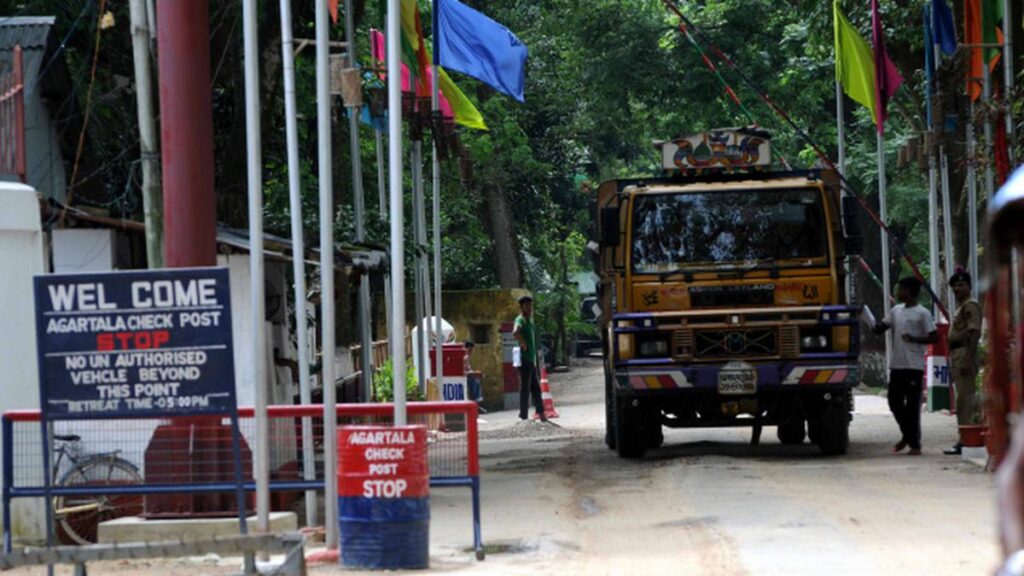Tripura, a landlocked state in Northeast India, shares its borders with Bangladesh on three sides, making cross-border trade a significant aspect of its economy. Border trade has played a pivotal role in transforming the socio-economic landscape of Tripura, opening up avenues for development, enhancing regional connectivity, and fostering diplomatic ties with neighboring nations. This article explores the manifold impact of border trade on Tripura’s economy, shedding light on its advantages, challenges, and the way forward for sustained growth.
Advantages of Border Trade:
- Boost to Local Industries:
Border trade has provided a lifeline to local industries in Tripura. With access to a large market in Bangladesh, various products, including agricultural produce, handicrafts, and textiles, find eager consumers across the border. This surge in demand has led to the growth of small and medium enterprises, generating employment opportunities and promoting economic prosperity.
- Infrastructure Development:
To facilitate seamless trade, significant investments have been made in infrastructure development. Improved roads, custom checkpoints, and integrated border trading facilities have bolstered cross-border logistics, reducing transportation costs and enhancing trade efficiency.
- Revenue Generation:
Border trade has significantly contributed to revenue generation for both the state and central governments. Import and export duties, along with other taxes, have provided additional resources for developmental projects and public welfare schemes.
- Enhanced Regional Integration:
Border trade has fostered closer economic ties with neighboring countries, particularly Bangladesh. This enhanced regional integration has facilitated mutual cooperation, cultural exchanges, and diplomatic relations, leading to a more interconnected and peaceful region.
Challenges and Mitigation:
While border trade has been beneficial, it also presents its share of challenges:
- Infrastructure Bottlenecks:
Though significant strides have been made in infrastructure development, challenges remain in certain areas. Improving connectivity, particularly in remote border regions, requires continued investment and efficient implementation.
- Trade Imbalance:
Tripura predominantly imports more from Bangladesh than it exports, leading to a trade imbalance. Focusing on promoting export-oriented industries and products can help address this issue.
- Non-Tariff Barriers:
Non-tariff barriers and bureaucratic red tape at border checkpoints can hinder smooth trade. Streamlining administrative processes and implementing trade facilitation measures are essential to overcome these barriers.
- Currency Fluctuations:
Currency fluctuations can impact trade, especially for small traders. Exploring mechanisms for currency hedging and financial assistance can mitigate risks and ensure stability.
The Way Forward:
To leverage the full potential of border trade, Tripura must focus on the following areas:
- Diversification of Trade:
Efforts should be made to diversify the range of products traded, with a focus on promoting value-added goods. This will not only reduce trade dependence on a few commodities but also open up new business opportunities.
- Skill Development and Capacity Building:
Enhancing the skillset of traders and entrepreneurs engaged in border trade is crucial. Training programs on market trends, quality standards, and modern trade practices can improve competitiveness.
- Cross-Border Cooperation:
Strengthening cooperation between India and Bangladesh at the central and state levels is essential for resolving trade-related issues and promoting a conducive trading environment.
- Digital Trade Facilitation:
Implementing digital platforms and e-commerce solutions can simplify cross-border trade procedures and provide access to a wider customer base.
Border trade has emerged as a driving force for economic growth in Tripura, transforming it into a dynamic and thriving hub of commerce in Northeast India. The advantages of border trade, including local industry growth, infrastructure development, and revenue generation, outweigh the challenges it poses. By addressing these challenges and adopting a strategic approach, Tripura can further harness the potential of cross-border trade and continue its journey towards inclusive and sustainable economic development. The integration of border regions and the strengthening of bilateral ties with neighboring countries will not only boost the state’s economy but also promote regional stability and prosperity. As Tripura continues to capitalize on the opportunities presented by border trade, it positions itself as a key player in the evolving economic landscape of Northeast India.

